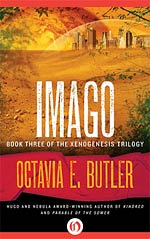
![]() Naomi_uk72
Naomi_uk72
3/20/2015
![]()
Imago is the third and final volume in Octavia E. Butler's Lilith's Brood trilogy, and if I'm being honest I'm not entirely sure whether or not to say it's my favourite of the three. On the one hand I found it to be an excellent read, but once I'd finished it I couldn't help but feel a little disturbed by some of the concepts raised by the story.
For those who aren't familiar with this trilogy, it essentially follows three individual members of a single family, consisting of the matriarch (the character Lilith of the series title) and two of her offspring, both of who are the result of a form of interbreeding between Lilith and her alien lovers/mentors/captors.
The first book tells the story of Lilith, and how she found herself under the care of the alien Oankali following a catastrophic war on Earth, while the second book tells the story of her son, the first human/Oankali male born of the union. Both of these books did an excellent job of introducing the Oankali to the reader, and also of showing the way in which the Oankali effectively manipulate and control their human charges. What makes this particularly acceptable to the reader, especially in he second book, is that way in which Butler presents the alien point of view so sympathetically, making it as clear as possible that the Oankali want nothing more than to help humanity, while at the same time making it just as clear that by the time they've finished with their work humanity will no longer exist.
With book three we are introduced to a second human/alien offspring, Lilith's child Jodahs, who is introduced as the first construct (cross-bred) ooloi. Within Oankali society, the ooloi are a third gender, best described as a gender neutral bridge between male and female. They take on the role of progenitors within an Oankali family, effectively mixing genetic material from their male and female mates to create and birth a new child. They also have an innate ability for analysing and modifying the genetic structure of any organic matter they come into contact with, to the degree that they can actually create new life in any form they have previously experienced simply by modifying and releasing their own cells. This also makes them excellent healers, and in the case of the main character also gives it (Butler's choice of pronoun) the ability to change its shape and appearance quite extensively.
As the first human/Oankali ooloi, Jodahs is seen as potentially very dangerous; its lack of control over its own body suggests that it may inadvertently create a catastrophic disease within Earth's ecosphere, or possibly cause unintentional harm to those around it. A consensus is reached for Jodahs to stay with its family, under close observation of its Oankali ooloi parent, but when a second human/Oankali child (Jodahs' closest sibling, Aaor) also begins to transform into an ooloi, a new course of action is decided. In an effort to limit the possible damage Jodahs may cause, it and a large portion of its family go into semi-voluntary exile, eventually leading Jodahs to an encounter with two genetically deformed human siblings who it bonds with and forms a family. This then leads to Aaor becoming consumed with a need for mates of its own, which in turn (after a few misadventures) leads to the two ooloi setting up a new colony of their own, and a rosy outlook for human/Oankali development in the future.
While I admit that Butler's writing style is remarkably readable, and her ability to put across the mindset of both the utterly alien Oankali and the human/Oankali constructs, there's a number of things in this (and to some degree the previous two books) that I found just a little disturbing. And I'm not talking about the cross-species mating or the casual use of sibling incest, as both of these concepts are explored incredibly proficiently from the alien mindset and therefore do not carry the same sense of taboo they might if viewed through human eyes. In fact, the thing that disturbed me the most was the ease with which the Oankali are able to manipulate humanity (or a certain portion of humanity, at least). From a purely human-centric point of view what the Oankali are doing and what they have planned is far from the right thing to do, but by explaining it primarily from the viewpoint of the Oankali-centric characters Butler very skilfully makes their actions and plans not only the correct course of action, but also undeniably acceptable. I only wish I could write with half the skill exhibited in the this series.
To finish off, I found this and the previous two books incredibly emotionally challenging, but also incredibly fulfilling and enjoyable. If you like your sci-fi to leave you with a lot to think about, if you like sci-fi that challenges you in any way, then I would definitely suggest reading the entire trilogy. However, if you like your sci-fi simple and full of space battles then I'd say steer clear of this one.